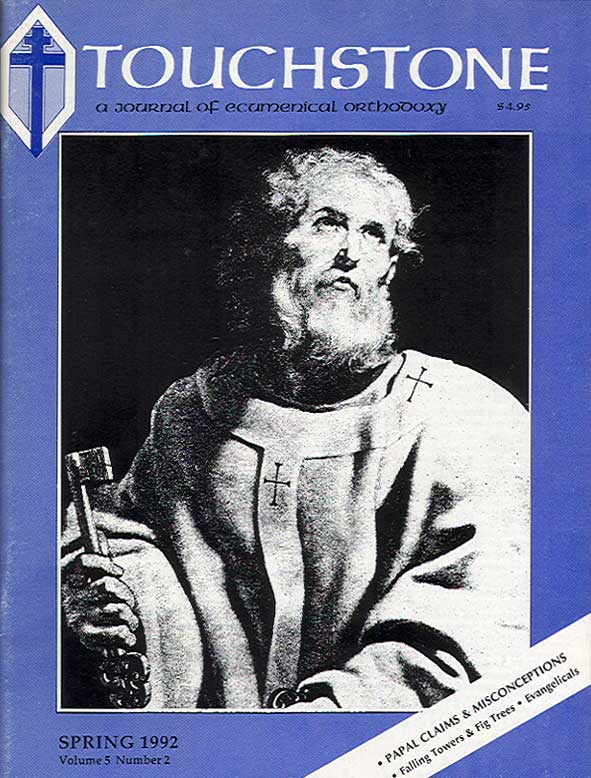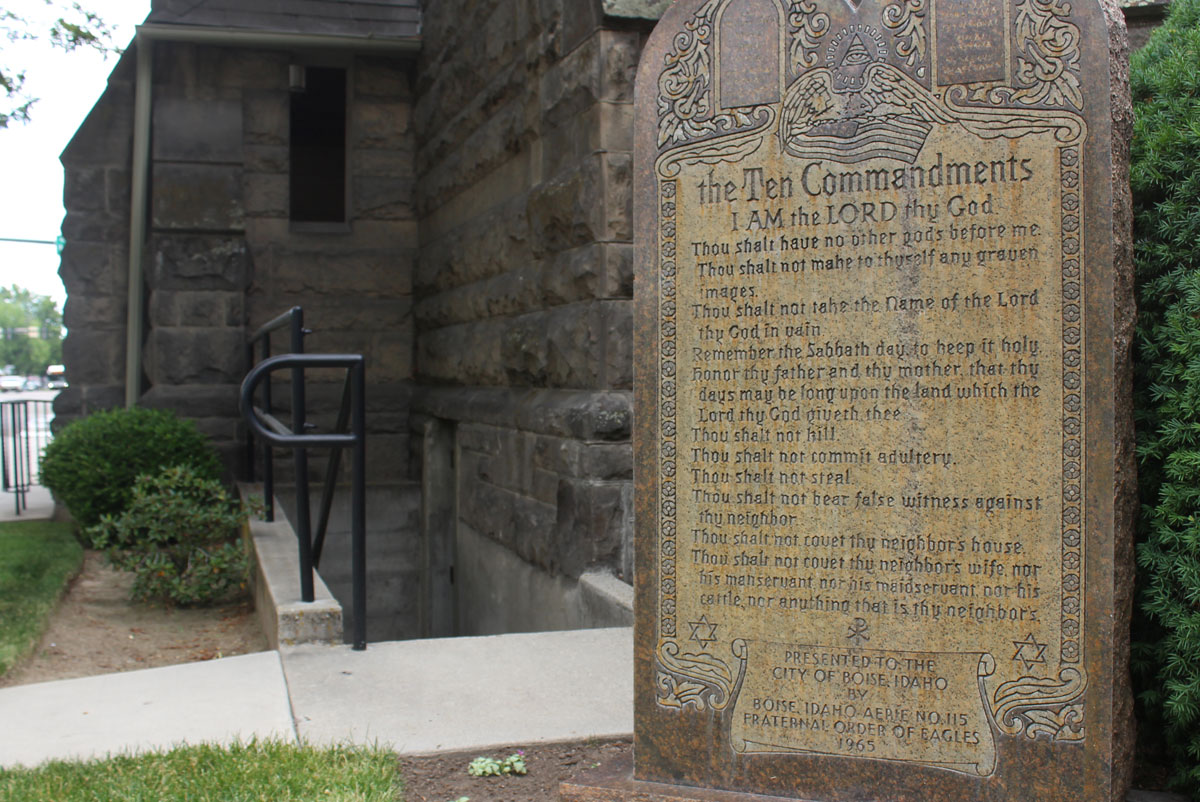On Falling Towers and Fig Trees
A Sermon by S. M. Hutchens
I.
Today’s New Testament readings, which we will review presently, all speak against the sin of presumption. A presumptuous person is someone who has willfully forgotten that whatever is good in him comes from God’s generosity to a sinner. He malappropriates the grace of God by making it his proper possession, the stuff of self-congratulation. Salvation is transformed from a living relation to a loving and terrible God to a regular fixture of his accustomed world. The means of grace are similarly accepted as “given,” not as unmerited gifts, but as something due because God is obliged to keep his promises. Other divine benefits become viewed not as things loaned for the exercise and testing of stewardship, but as objects of a title deed. One might describe the attitude of a presumptuous person by turning the description of Christ found in Philippians 2 on its head:
This is the mind of the presumptuous, who, finding himself in the form of the redeemed, regards his redemption as something to be grasped, and exalts himself, taking on the form of a master, and who, finding himself in this form, judges his brother to justify himself rather than allowing himself to be judged to justify his brother.
II.
One of the most insidious forms of presumption is carried in gossip about the misfortunes of others.
There were some present at that time who told Jesus of the Galileans whose blood Pilate had mingled with their sacrifices, and he said to them, “Do you think these Galileans were worse sinners than all other Galileans because they suffered thus? I tell you, No; and unless you repent you will all likewise perish. Or those eighteen who were killed when the tower in Siloam fell upon them. Do you think they were worse offenders than all the others in Jerusalem? No, I tell you—and unless you repent you will all likewise perish.” (Luke 13:1-5)
We make an equation or a proportion between the suffering of others and their sins almost reflexively. It is a temptation to be resisted, with fear. Most recently I have found myself doing it when hearing of terrible troubles in other parts of the world—in Ethiopia, Kampuchea, or Russia, for example. It is very natural, I tell myself, that so many years of lies and corruption in these societies should eventually bring confusion, pain, hunger, and death. The chickens must come home to roost: belief in a false religion or ideology, or a debased form of Christianity must eventually show itself for what it is, and bear the fruit that is natural to it. It is tragic, but these Galileans do seem in some ways to be worse than all the rest of us because they suffer thus. There, but for the grace of God go I—but thank God, I’ve got the grace!
Well, no, not so—at least not in the way that I’m tempted to think. It is impossible for us to tell whether the troubles of others are signs of divine wrath or favor. Indeed, they may be both at once, in manners and proportions that are beyond our power to understand. What I regard as the grace that brings me comfort while others suffer may be the mark of my own condemnation, for it is written that “God scourges every son he receives.” What looks like harsh treatment from our perspective may well be a sign of God’s love that must be endured by each of his true children to purify them and test their faith.
Now to be sure, to be massacred at worship or crushed by a falling tower are indeed images of condign punishment for certain kinds of sin. So is crucifixion. I don’t think those who brought the report to Jesus were wrong about this. They got the idea from Scripture to begin with. Where they were wrong was in excusing themselves as those who enjoyed the favor of God because they survived certain tragedies, and using the sign to render judgment upon those who had not escaped as judged by God—precisely what people who thought themselves righteous did to the dying Jesus, regarding him as stricken, smitten of God, and afflicted, and wondering who had sinned, this man or his parents, that he should meet this end.
We are not allowed to make an equation (or proportion) between the spiritual states of those who suffer and the calamity that has befallen them, for this calls for the power of judgment, which has been delivered by the Father to Christ alone, and which even he has not yet exercised in a final way. We are, however, invited to view the situations themselves as symbols of a judgment to which we ourselves are liable. This calls for an entirely different attitude—indeed, an entirely different condition and habitude of soul than that of the accuser.
The drunkard falls down the stairs and kills himself. The homosexual AIDS patient dies as a direct result of indulging a forbidden lust. It may well be that the ends of people like this have come upon them for precisely the reason that appears. St. Paul is not stepping out of bounds when he asserts as a general truth that people receive in their bodies and minds the due reward of their sins. We are free to see every visible link between sin and its results. But we are not allowed to pronounce or even infer judgment on others, for we do not know—we cannot know—enough to judge well. Even simple cases are infinitely beyond our power in our present state. We are free to regard what has happened as a symbol of judgment for the kind of sins that have been committed. One may even render a legal judgment upon those who commit crimes. This is by no means forbidden by Scripture.
But we may not cross the line at which we judge another on the basis of our own moral superiority. No one who expects to die, and thus receive in his own body the reward of his sins, has the spiritual leverage to do this. We haven’t the authority to convict others of sin as long as we are found in the same condition. We hate the sin and love the sinner because we are the sinner. It is not, “There, but for the grace of God, go I,” but “There am I: Lord have mercy.” If homosexuals, in contracting a fatal, wasting disease, are receiving the due recompense of their sins—which may indeed be the case—then what would you or I receive if we were given a sickness that reflected our own besetting sins upon our bodies? What would happen to our tongues, our hands, our feet, our minds, our sexual organs, if we received in them the just reward for what we have done with them? Let us tremble at the thought and forgive lest we be unforgiven. In the eighteenth century, fashionable young ladies used to tour the halls of Bedlam—the Bethlehem Asylum in London—to shock and amuse themselves with the wretchedness of its inmates, little knowing that they were gazing upon the details of their own interior lives. Lord, have mercy, and deliver us from presumption!
III
Jesus told this parable: A man had a fig tree planted in his garden, and he came seeking fruit on it, but found none. He said to the vinedresser, “See here, for three years I have come looking for fruit on this tree, but haven’t found any. Cut it down; why should it burden the ground?” The gardener answered, “Let it alone, sir, this year also, till I dig about it and put on manure. If it bears next year, well and good, but if not, you can cut it down. (Luke 13:6-9)
Jesus is here bringing to the minds of his hearers a conversation within the Godhead of which they (who had the prophets) already had reason to know, but of which all need to be constantly reminded until the day dawns when the last reminder has been given. God appears in the parable in a dual role, as both the judge of the tree who orders its destruction, and the vinedresser who asks that it be nourished, stimulated, and given time to bear fruit. The application in its wider sense is to fallen creation as a whole, and in many narrower senses to Israel, to the Church, to various institutions planted and supported by God for his own special purposes, including each one of us. Fruit—whatever it is that God expects from us—is demanded of each, and if fruit is not forthcoming, the tree will be justly, and unapologetically destroyed.
Let us note that the tree itself—that person, nation, church, congregation, family, fellowship, or institution—is not outside the vineyard, but within it. It was planted by order of God in a rich and guarded place, with full promise, gift, and potential. It is apostolic; it is canonical; it has the Fullness of Figtreeness (being descended in a right and undivided line from the first Fig Tree); it is a birthright, baptized, born-again, spirit-filled, entirely sanctified, catholic, evangelical, fundamental, Bible-believing, messianic, full-gospel, fig tree with full benefit of the good ground upon which it stands—or rather, should we say, sits. We may assume there is nothing wrong with its roots, its trunk, or its leaves. It is not sick, old, or pest-ridden. It has everything a fig tree could possibly be expected to have—except what it was planted by its owner to give.
We might expect the tree, if it had a voice, to give many good arguments in its own behalf—that it was a true fig tree (perhaps it would even claim with some justification, to be The Fig Tree), in itself a thing of beauty, that its leaves were useful for shade, its bark for dye or medicine, and so forth. The Master might agree, but the fact remains that it is a fig tree, that he regards all its other qualities as ancillary to the production of figs. He wants figs from it, and if he doesn’t see what he defines as figs, down it comes. The fig tree’s opinion of itself, you see, doesn’t matter. What matters is that of its owner. Its continued existence on the ground as fig tree is wasteful and presumptuous when it doesn’t give him figs. The fertile ground of the orchard, itself valuable, could be used for other plants, plants perhaps not nearly so grand as a fig tree, but the kind that will bear what the Master expects of them.
The fig tree, is, so to speak, presuming on its baptism, upon its official membership in the family of vineyard plants. It is this very act of presumption of which St. Paul speaks in First Corinthians 10, which was read this morning. Let me paraphrase it this way, continuing with the Lord’s tree metaphor:
I want you to know, fellow Christians, that our Jewish forebears were, like us, legitimately planted in God’s vineyard. They all drew the same nourishment from the same good ground that we do, for they were, through Moses, established in Christ, as we are. Nevertheless, their presumptions were punished, for most of them were culled out—quit literally hewn down and thrown away. A record was made of these things to serve as a warning to us, not to desire evil as they did . . . . Let any who thinks that he stands take heed lest he fall.
In the Bible, the destiny of the plant that produces bad fruit is the same as that which produces no fruit at all, for both are equally worthless to the Owner of the vineyard. Neutrality on the matter of fruit is as good as hostility toward it when one is a fig tree. There are certain things which the Master of the vineyard does not regard as negotiable. A fig tree might even be able to get away with a great deal of unloveliness as long as it bears a good crop of figs. This is something the churches that pride themselves on their pedigrees, their beauty, and their pristine orthodoxy—their magnificent situation in God’s orchard—would do well to remember. Our Lord issued no threats against ugly fig trees, just unfruitful ones, and if we would seek to be where his blessing is, we should look not for perfection, but for places that are showing good, wholesome, fruit.
We humans are so deeply and thoroughly imbued with and susceptible to sin that God in his grace and by his Son finds it necessary to give us this the sternest of all warnings, the warnings of the fig tree. It is this: the worst could happen to you. It has happened to others whom God loved no less.
It has not yet, however, happened to any who have ears to hear what is being said here, or it wouldn’t be said. We have been redeemed, to be sure, but from the only perspective allowed to us we are still suspended between heaven and hell. It is necessary to have our very complacent roots disturbed, and if we get a cartload of manure thrown at us from time to time, we shouldn’t be surprised. It is all being done by a very earnest Gardener who has nothing but our good in mind. Please God, there is still time to give the Master what he wants.
IV
Presumption as such is not in the catalog of the Seven Deadly Sins. But I think this is because we are more used to thinking of pride in terms of bristling arrogance than a complacent tendency to self-satisfaction and to judge the conditions of others. A presumptuous person is always willing to repeat the litany of humility, “What do I have that I have not received?” But this is authentic only if it is said in the spirit of humility, and it can be cultivated only in the fear of God and lively awareness of our own sin. Otherwise it is merely self-praise.
The fear of the Lord is clean, enduring forever; the ordinances of the Lord are true, and righteous altogether. More to be desired are they than gold, even much fine gold—sweeter also than honey and drippings of the honeycomb. Moreover by them is thy servant warned; in keeping them there is great reward. But who can discern his errors? Clear thou me from hidden faults. Keep back thy servant also from sins of presumption; let them not have dominion over me! Then I shall be blameless, and innocent of great transgression. Let the words of my mouth and the meditation of my heart be acceptable in thy sight, O Lord, my Rock and my Redeemer. (Psalm 19:9-14)
S. M. Hutchens is a Touchstone senior editor.
bulk subscriptions
Order Touchstone subscriptions in bulk and save $10 per sub! Each subscription includes 6 issues of Touchstone plus full online access to touchstonemag.com—including archives, videos, and pdf downloads of recent issues for only $29.95 each! Great for churches or study groups.
Transactions will be processed on a secure server.
more from the online archives
calling all readers
Please Donate
"There are magazines worth reading but few worth saving . . . Touchstone is just such a magazine."
—Alice von Hildebrand
"Here we do not concede one square millimeter of territory to falsehood, folly, contemporary sentimentality, or fashion. We speak the truth, and let God be our judge. . . . Touchstone is the one committedly Christian conservative journal."
—Anthony Esolen, Touchstone senior editor










